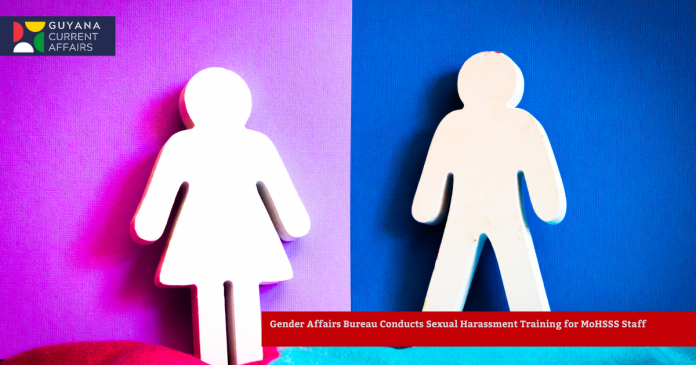In a significant step towards fostering a respectful and equitable work environment, the Gender Affairs Bureau (GAB) recently conducted a comprehensive training program on sexual harassment for staff members of the Ministry of Human Services and Social Security (MoHSSS). This initiative aligns with broader efforts in Guyana to address gender-based violence and promote workplace safety.
Training Objectives and Content
The training session aimed to equip MoHSSS staff with a nuanced understanding of sexual harassment, including its various forms and the importance of implementing effective organizational policies. Participants were educated on the proper procedures for reporting and investigating incidents, as well as the critical role of employer protection against retaliation for those who file complaints. This approach contributes to creating a more secure and just work environment.
Context and Significance
This training is part of a larger framework of initiatives by the GAB and MoHSSS to combat gender-based violence and harassment. Similar programs have been conducted for other organizations, such as the Guyana Power and Light Inc. (GPL), highlighting the commitment to addressing these issues across various sectors.
The Ministry of Human Services and Social Security has been actively engaged in promoting gender equality and addressing violence against women and girls. This includes collaborations with international partners like UN Women under the Spotlight Initiative, which aims to eliminate gender-based violence in Guyana.
Impact and Future Directions
The training is expected to have a positive impact on workplace culture, enhancing awareness and sensitivity among staff members. It also underscores the importance of having robust policies and procedures in place to handle sexual harassment complaints effectively.
As Guyana moves forward with legislative reforms, such as the proposed Protection from Harassment Act, these training programs play a crucial role in preparing institutions to comply with new regulations and foster a culture of respect and accountability.
Conclusion
The Gender Affairs Bureau’s sexual harassment training for MoHSSS staff reflects a broader commitment to creating safe and respectful workplaces in Guyana. By educating employees and promoting effective policies, these efforts contribute to a more equitable society where individuals can work without fear of harassment or retaliation. As the country continues to address gender-based violence, such initiatives will remain vital in shaping a safer and more just environment for all citizens.


